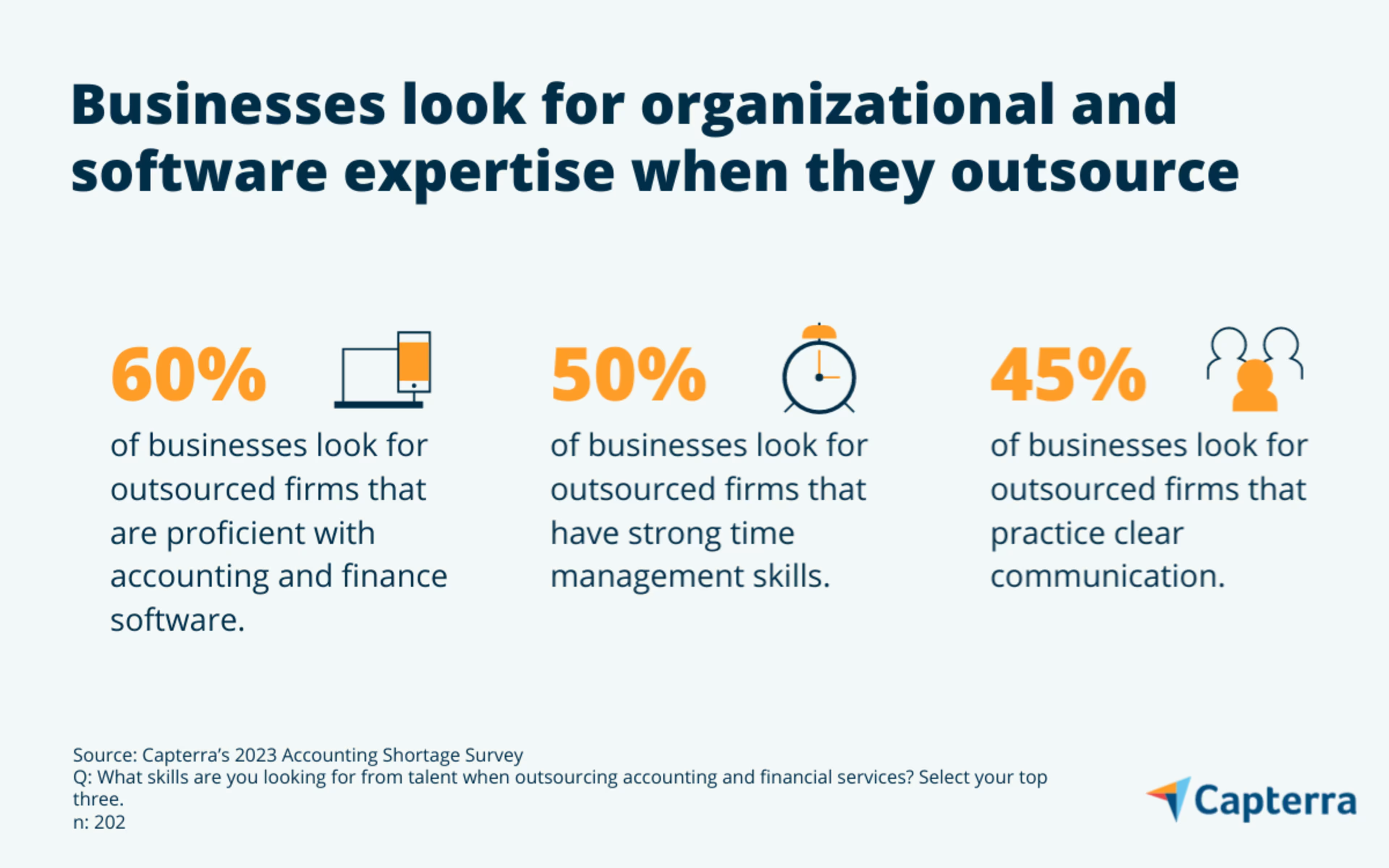Shortlisting the right accountant or agency becomes easier when you ask the right questions.
Hiring an external accountant or accounting agency is a great way to have professionals take care of your bookkeeping and tax filing needs without losing focus from your core business operations or having to worry about managing an in-house accounting department.
But it’s essential to have a clear hiring plan as you’ll likely face rigorous competition for these professionals. With a reported talent shortage in the U.S. accounting sector, securing the right accountant to meet your company’s financial needs can be a challenge.
We spoke with two small-business leaders, Sascha Humer, founder of eCommerce store Seductiv[1], and Min Hwan Ahn, an attorney and owner of a New York-based law firm[2], to understand the key to finding a good accountant and maintaining a solid working relationship with them.
“Taxes and finances are a complex maze, and unless you’re willing to become a full-time expert, mistakes are bound to happen. Having expert assistance to navigate accounting complexities frees you up to focus on business growth and ensures you're always on the right side of the law.”


Sascha Humer
Founder, Seductiv
“Our main challenge was reconciling transactions with bank records—a time-heavy task prone to human error. We simplified this by outsourcing. We started with the monthly financial recording and bank reconciliation process and eventually handed over our entire accounts payable and receivable management, general ledger, and taxation. Delegating these important but non-core business tasks has been a tremendous stress relief.”


Min Hwan Ahn
New York-based attorney
1. How well do you know my industry, marketplace, and offerings?
Ask the candidate or agency about their experience in your industry and how long they’ve been catering to businesses like yours. This question is important as tax regulations, tax exemption criteria, and accounting rules differ based on industry and geography. For instance, hotels and motels follow the Uniform System of Accounts for the Lodging Industry (USALI) over and above the regularly followed Generally Accepted Accounting Principles (GAAP).
Check the candidate’s relevant experience in your industry and market. Relevancy is when their current client base is in the same growth phase as you (startup, emerging, or large business) and selling to the same vertical market or business model (B2B or direct consumers).
2. Can you share case studies or examples of how you’ve helped businesses like ours manage their finances?
The candidate or service agency should be able to demonstrate past success through customer reviews, testimonials, reference stories, etc. If they can’t present any evidence, their claim of successfully delivering services could be questionable.
Evaluate the case studies of past clients to gain a clear understanding of the results and performance the accountant or agency can deliver. Look for quantifiable outcomes, such as tax savings, expense reductions, and revenue growth. If these metrics are not explicitly mentioned, don’t hesitate to ask for them.
3. How do you stay up to date with tax laws and regulations?
In the U.S. and around the world, small businesses are offered access to an array of credits and tax deductions. And while it may not be possible for your prospective accountant to monitor every regulatory change, they should demonstrate a proactive approach to staying updated. Ask about the resources they invest time in reading or the industry conferences or webinars they participate in. Also, seek examples of how their knowledge of recent legislations has benefited their clients.
For instance, the Inflation Reduction Act 2023 helps SMBs reduce healthcare costs, promote investments in energy efficiency, and boost research and development through tax credits and reductions. If your accountant can’t inform you of the advantages of such plans, your small business will miss out on potential benefits.
4. Do you have experience with automation tools?
With the widespread use of artificial intelligence in accounting, it’s crucial to understand how an accountant or agency leverages these tools to not only save time and money but also extract insights and provide better business support.
Automating accounting tasks can significantly improve the efficiency and productivity of your operations. For instance, automated tracking and follow-ups for late payments or automated reconciliation of accounting records with bank statements can save your accounting team hours of manual workload. To assess this ability, make note of the software tools the potential candidate or agency uses.
Also, inquire whether their firm can provide updated financial reports on demand to help you stay in control of your finances. Finally, ask about the data protection mechanisms in place to safeguard sensitive financial information. Cloud-based systems, often involved in automation, are more susceptible to hacks and cyber-attacks.
5. What types of services do you offer, and which is your specialty?
According to Capterra’s 2023 Accounting Shortage Survey, around 71% of business owners outsource some portion of their accounting and finance tasks.* The goal is to ensure the outsourced accounting agency’s services align with your specific needs.
While common services such as bookkeeping and tax planning are standard across accounting firms, not all agencies might have the expertise of a certified public accountant (CPA) or offer business advisory services. To gauge their areas of expertise and proficiency, inquire about the services most frequently requested by clients or provided by the firm. You can also check the agency’s website or customer reviews to get an overview of their service portfolio.
The typical services provided by an accounting firm or accountant include:
Financial reporting: Preparation of financial statements to get an accurate overview of your business's financial health.
Bookkeeping: Tracking and recording financial transactions for easier audits.
Expense tracking: Monitoring daily expenditure to regulate the cash flow.
Payroll processing: Processing employee salaries, tax obligations, and deductions.
Tax filing: Preparing year-end reports and filing taxes.
Tax planning: Analyzing financial records to devise long-term tax strategies.
Reconciliation: Checking for discrepancies between bank statements and bookkeeping records.
Larger or advanced accounting firms may also offer risk management, business valuation, and business strategy recommendations. The image below highlights key areas that small businesses evaluate when outsourcing their accounting function:

6. What is your pricing model?
The cost of hiring an accountant or accounting firm usually depends on the scope of work, the services you want, the length of your project, and the accountant’s experience. For instance, if you want close involvement of an experienced certified financial planner (CFP), you’ll have to shell out more. Before deciding, thoroughly examine the pricing model and discuss costs beforehand.
Humer’s business uses a progressive fee model where charges are dependent on the volume of invoices processed by the accounting firm. “So, the more invoices, the higher the fee,” says Humer.
Some other common pricing models include hourly billing (you pay the accountant by the hour), fixed fee (you pay a fixed rate that doesn’t factor in the number of hours the accountant logs), and value-based pricing (you pay based on the value of the work the accountant does, which differs from one service to another).
7. Will you be readily available to respond to our queries or offer financial advice?
From the outset, establish clear communication channels with your point of contact (POC). Avoid having too many POCs to ensure clarity in communication.
Identify which staff members will be assigned to your business account and understand their availability for addressing queries or offering advice. Ensure their availability matches your business hours for real-time connects. Additionally, check out their qualifications and evaluate the skills they contribute. If their talent doesn’t resonate with your needs or preferences, express your concern or ask for an alternative team member.
Taking these steps will foster a clear and strong start to your relationship and help avoid a “pitch-and-switch” approach due to unexpected changes in personnel or service quality.
8. Can you provide three references from past or existing clients?
To validate client success stories, request three references. Seek a mixture of new and long-term clients, and from these references, inquire about the services you’ll most likely need. This conversation will reinforce your confidence and trust in a potential accounting service partner. If a reference client cannot verify the services pitched to you by the firm, consider that a huge red flag.
Searching for an accounting firm to hire for your business? We’ve got you covered. Check out our list of companies in the following areas:
Maintain open communication with the accountant or agency
Starting with a new accounting service provider can be challenging. The initial phase often requires familiarizing them with your company's specific needs, which can be expedited through regular meetings and open communication until they fully grasp your requirements.
Humer explains, “One of the biggest challenges we faced was in the initial stages. The invoices had minor discrepancies that required our attention. Also, we felt a bit too involved in the day-to-day initially. But through open dialogue, we could step back without losing control and streamline the process.”
Despite initial hiccups, both Humer and Ahn say they see themselves maintaining a long-term relationship with their current service provider. “The peace of mind they provide is invaluable to us,” mentions Ahn. “We have no plans to bring the accounting department in-house.”
Additionally, Humer suggests asking some more questions personalized to your situation to avoid getting stuck with a provider who may not understand your business. “We subjected potential partners to rigorous questioning—topics related to international business and the U.S. and EU tax laws—only answerable by those with a deep understanding of our situation.”
/ Additional questions you can ask accountants
What business structure should we adopt?
Does your firm operate internationally? What is your experience with international tax laws (for example, EU tax laws)?
What are some ways in which we can streamline our accounting processes and save money?
How do you ensure the confidentiality and security of our financial data?
How well equipped is your firm to handle our growth plans? Can your services scale with us as we expand?
If our company were to be audited, how would you provide support?
Can you describe a situation where you helped a client resolve a dispute with the Internal Revenue Service (IRS) or another tax authority?
What strategies do you recommend for minimizing tax liability while staying compliant with laws?
Check out this quick video where we breakdown the process of choosing the right accounting partner in three simple steps.
Early signs an accounting firm is a good fit
Before you enter the interview stage or ask the questions mentioned above, shorten your list to companies or accountants you really want to talk to. During your initial shortlist, here are three things to look for:
Industry knowledge: Search for a firm that specializes or has worked with businesses in your industry and region. They should understand your unique challenges and accounting needs. You can check this by looking at their portfolio of past clients, examining ratings and reviews on third-party websites such as Capterra, or directly questioning them during initial discussions.
Relevant services: Make a list of the services you need right now and may need in the near future, and match those needs with the services provided by the firm. These services can include bookkeeping, managing employee payroll, and preparing taxes. You can find this information on their agency’s website or in their service brochure.
Good reviews: Look for positive customer testimonials, comments, or reviews from previous clients, particularly those who are in the same industry and geography as you. Typically, you can find this information on their agency’s website or on third-party websites that rate and review accounting service providers.
Want to compare different accounting firms?
Read what user ratings and reviews say about the top accounting service providers on Capterra. Also, check out our comprehensive hiring guide for accounting services.
Not ready to outsource yet? Consider accounting software
If your business isn’t quite at the stage where it needs a lot of accounting help or an external expert, using accounting software may be a good choice. It can help you with basic bookkeeping and keep your financial records clean.
Our survey results found that of the 64% of businesses that had trouble finding a suitable accounting partner, almost half of them turned to software to avoid falling behind on their accounting tasks.*
Switching to a software solution can be a smart move if your needs are basic and you have some fundamental accounting skills to get started. Just remember, as your business grows, so will your accounting needs.
